
Summary Of The Four Tendencies - GRETCHEN RUBIN
The Four Tendencies by GRETCHEN RUBIN
Summary :
The four tendencies answers the question, “How do people respond to inner expectations, like a new year’s resolution, and to outer expectations, like a work deadline.” What I like about this model is that it’s simple, mutually exclusive, and actionable.
Understanding the four tendencies has three primary benefits:
1. Self-mastery in getting yourself to do things
2. Influencing others to do things
3. Understanding why others do or don’t do things, which reduces frustration and increases harmony.

- Upholders: I love routines, and people think I’m extremely disciplined.
- Questioners: I love researching, and people sometimes say that I ask “Why?” too much.
- Obligers: I put others ahead of me, and I value harmony in relationships.
- Rebels: I value freedom and choice; I do what I want to do, when I want to do it.
According to a representative sample, the distribution of the tendencies is 41% Obligers, 24% Questioners, 19% Upholders, and 17% Rebels.
In the rest of this article, I go through each tendency in the order mentioned above. For each tendency, I go through
- Strengths and Weaknesses
- How to Work with Yourself as that Tendency
- How to Work with Someone of that Tendency
You can skip to your tendency first, but I also recommend understanding all the tendencies so that you can better understand the people around you.
At the end of the article, I go over how I’ve applied the Four Tendencies in my life, and then I answer some frequently asked questions about the tendencies.
Upholders
Upholders readily meet inner and outer expectations. They are highly disciplined and love schedules and routines.
Strengths and Weaknesses of Upholders
An Upholder’s main strength is discipline, and their main weakness is that other tendencies may view them as rigid and cold. Although one might expect Upholders to be drained from constantly meeting so many expectations, they are actually energized by it, and they are great at scheduling self-care.
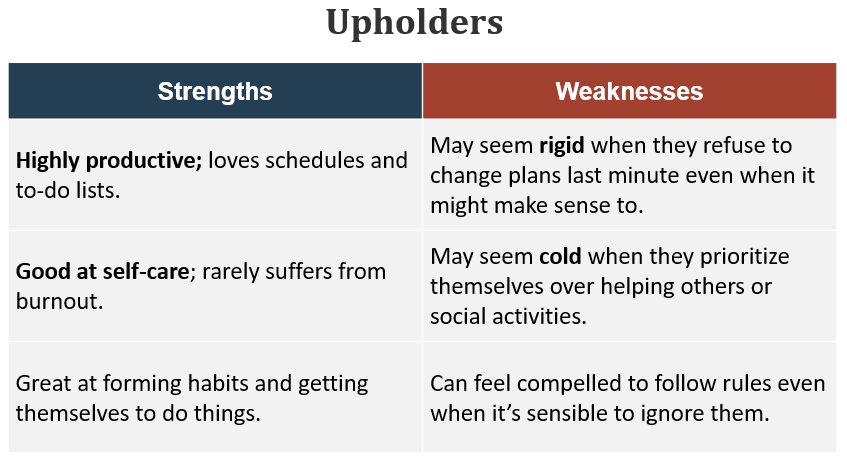
Working with Yourself as an Upholder
Upholders are usually pretty happy with themselves, but they can get judgmental or frustrated at other tendencies.

Working with an Upholder
Many people value Upholders in a relationship and team for the energy and discipline they bring.
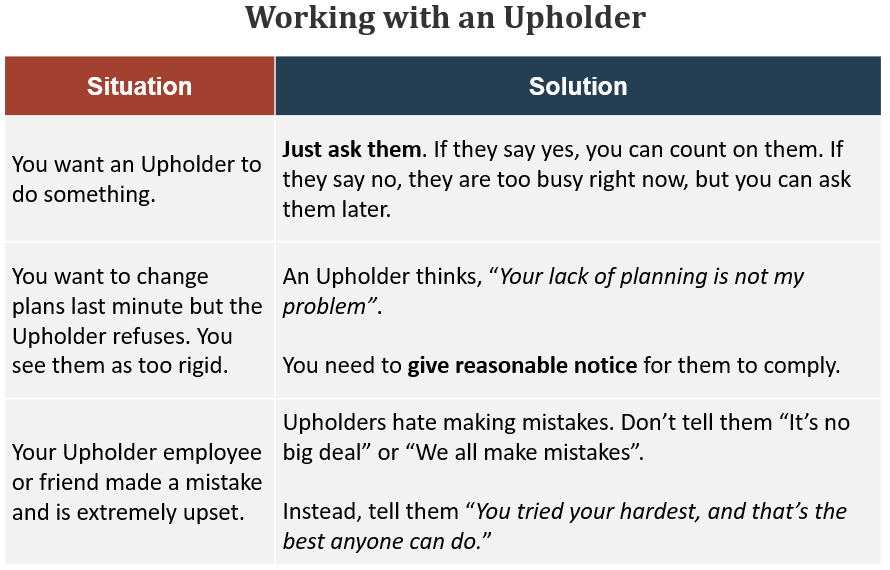
Questioners
Questioners turn all outer expectations into inner expectations if they believe its reasonable and efficient. Thus, Questioners only meet inner expectations.
Some random characteristics of Questioners: They hate waiting in line, they love spreadsheets, and they love sharing articles.
“Questioners have the self-direction of Upholders, the reliability of Obligers, and the authenticity of Rebels.” — Gretchen Rubin
Strengths and Weaknesses of Questioners
Questioners excel at being logical and efficient in everything they do. But they can also be viewed as annoying for their constant questioning unless they are very socially adept when asking those questions.
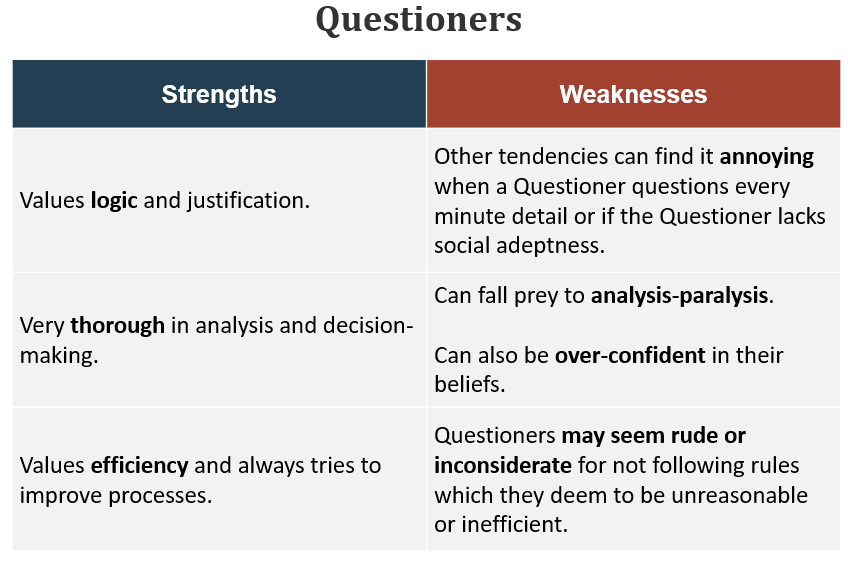
Working with Yourself as a Questioner
Questioners are generally pretty happy with themselves, but they can get frustrated at others for doing things that seem illogical or inefficient.

Working with a Questioner
Questioners can add value to relationships and organizations by ensuring people don’t unthinkingly accept expectations that aren’t justified or efficient.
They key with Questioners is justification. Once they accept an expectation, you can count on them to deliver (and maybe even improve upon a process for you.)
Ironically, many Questioners resist being questioned because they think, “If I made this decision, I obviously researched it thoroughly. It’s not my fault if you didn’t do your research on the topic.” Questioners also hate questions that are a waste of time. Their first thought is always, “Why should I bother answering this question?” If, upon reflection, you realize your question doesn’t really need to be answered, then let it go. If the question is important, then ask the Questioner to share their thought process and logic. They enjoy that.
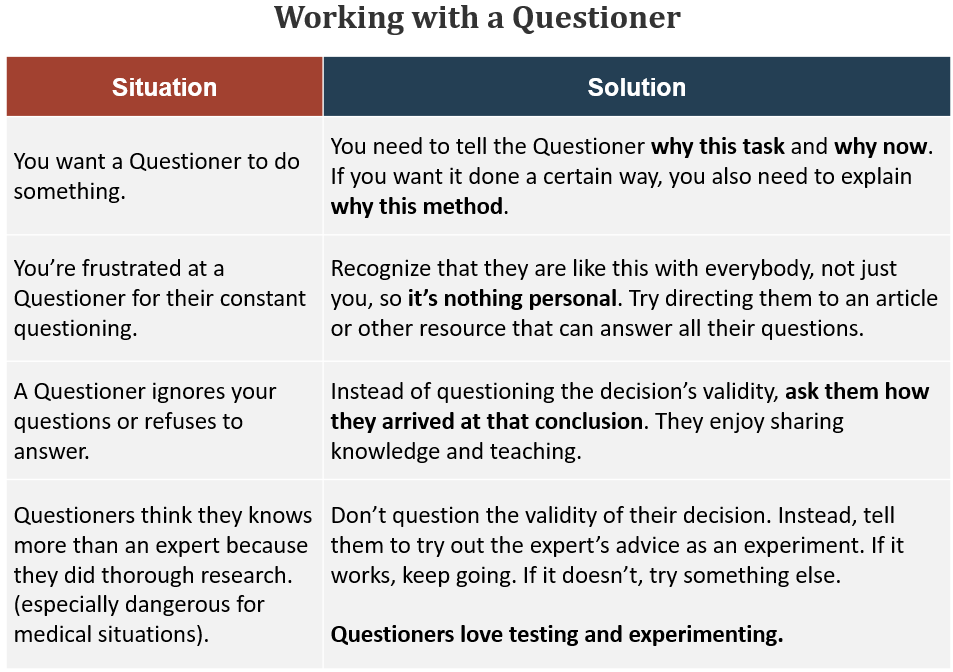
Obligers
Obligers need outer accountability to meet any inner expectation. For this reason, they gain the most from learning about their tendency.
“When what others expect from Obligers is what they expect from themselves, they have the life they want.” — Gretchen Rubin
Strengths and Weaknesses of Obligers
Obligers are the easiest tendency to get along with. But they often get frustrated at themselves for being unable to meet internal goals.
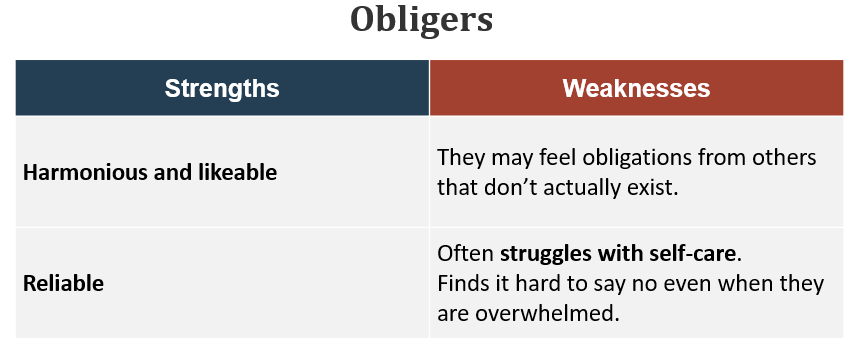
Working with Yourself as an Obliger
It’s worth mentioning again that Obligers need outer accountability to meet an inner goal. It’s not a sign of weakness; it’s just different wiring. Fortunately, there’s always ways to create accountability.
Obligers also vary dramatically in what makes them feel accountable. For some Obligers, a simple cellphone reminder may be enough. For others, they may need supervision or monitoring from others. Here are some ideas for creating accountability:
- Deadlines to someone else whose opinion you care about
- Monitoring via an app or a person (like a paid coach)
- Serving as a role model to those around you
- Thinking of what your future-self would expect of your current-self
- Spending someone else’s money for a class/course (rather than your own money)
- Getting an accountability partner (like a gym buddy or a reading buddy)
Unfortunately, Obligers are often taken advantage of, which leads to resentment. If an Obliger is faced with prolonged expectations that are unfair, unrealistic, nagging, or makes them feel taken for granted, an Obliger can fall into Obliger-Rebellion. When this happens, they will stop meeting all expectations and often do sudden and dramatic things like ending a marriage with an ungrateful spouse or quitting a job due to unfair treatment. After a period of time, even if nothing changes, the Obliger-Rebellion will end and the Obliger will go back to normal, but those burnt bridges will be forever burnt.
To prevent Obliger-Rebellion, Obligers must stand up for themselves. This can be very hard as its against their nature. Unfortunately, Obligers can’t count on other tendencies to stand up for them because other tendencies are all used to standing up for themselves (so they expect you to do the same). If you want to be free of these unfair expectations, the simple act of bringing it up in a conversation can often be enough.
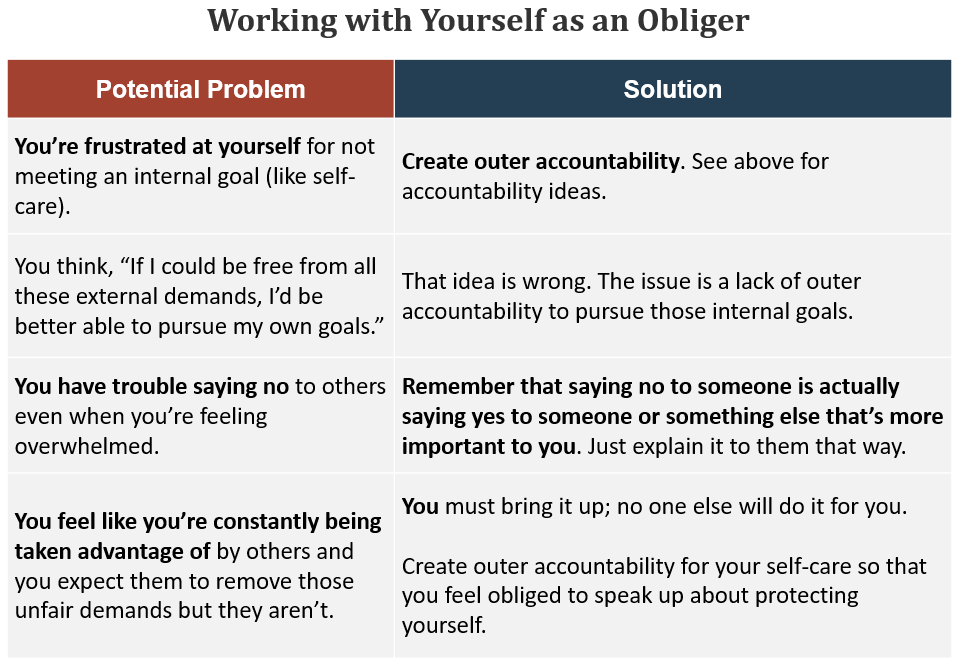
Working with an Obliger
Obligers are like the adhesive in a relationship or a team. They bring people together and maintain harmonious relationships. They are also very reliable.
As mentioned earlier, Obligers are often taken advantage of, so we need to do our part in making sure they are treated fairly. If you’re not sure whether you are taking advantage of someone, simply ask yourself, “If I was in their shoes, would I feel like I’m being treated unfairly or taken advantage of?” If the answer is yes, the Obliger probably feels that way too but just isn’t speaking up. Help fix the unfairness as soon as possible to mitigate the risk of Obliger-Rebellion.
Interestingly, some Obligers start to ignore expectations from their spouse. Ironically, it’s not because the Obliger doesn’t care, but rather the Obliger feels so close to their spouse that the spouse’s expectations become like inner expectations. So they ignore what their spouse wants just as they ignore what they themselves want! In such a situation, pointing it out might fix the issue. If not, then try to find other accountability.

Rebels
Rebels want to do what they want to do, in their own way, and on their own time. If someone else tells them to do the exact same thing, they will resist. They don’t even want to tell themselves to do something. They prefer to act from freedom, choice, and self-expression.
Strengths and Weaknesses of Rebels
Rebels might struggle with themselves because conventional advice doesn’t work for them. They are told to set goals and to get outer accountability by all the other tendencies, but those things actually make it harder for Rebels to do things because they feel a lack of freedom.
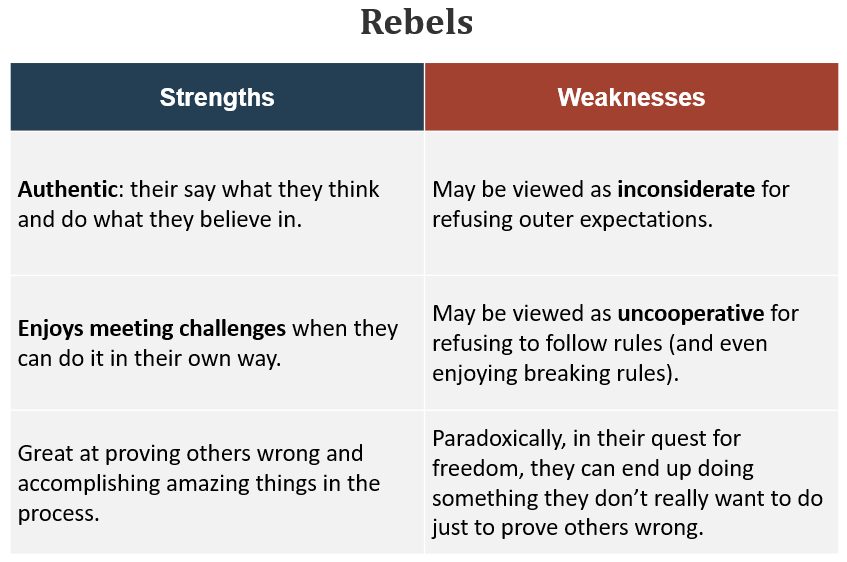
Working with Yourself as a Rebel
Rebels can do anything they want to do, so self-understanding is key for Rebels. They should get clarity on their values and use their values as decision criteria for whether or not to do things. For example, “I am a good partner, so I will take responsibility for my fair share of chores regardless of what my partner wants me to do.”
A Rebel can sometimes feel unproductive because the thought of having to do things makes them not want to do it anymore. The solution is to re-frame the tasks as a choice, challenge, or game. For example, instead of making a to-do list, a Rebel can make a could-do list and just do the things they feel like doing at that time. Another idea is to put a bunch of tasks on small folded-pieces of paper in a bowl. Then draw randomly from the bowl and do that item. This makes it a game of chance, but you can still be very productive this way.
When others ask Rebels to do something, they can feel less motivated to do it even if they originally wanted to do it. In these situations, a Rebel can remember, “I’m free to do something even if someone else wants me to do it.” After all, not doing something because someone else asked is just as un-free as doing it because someone asked.
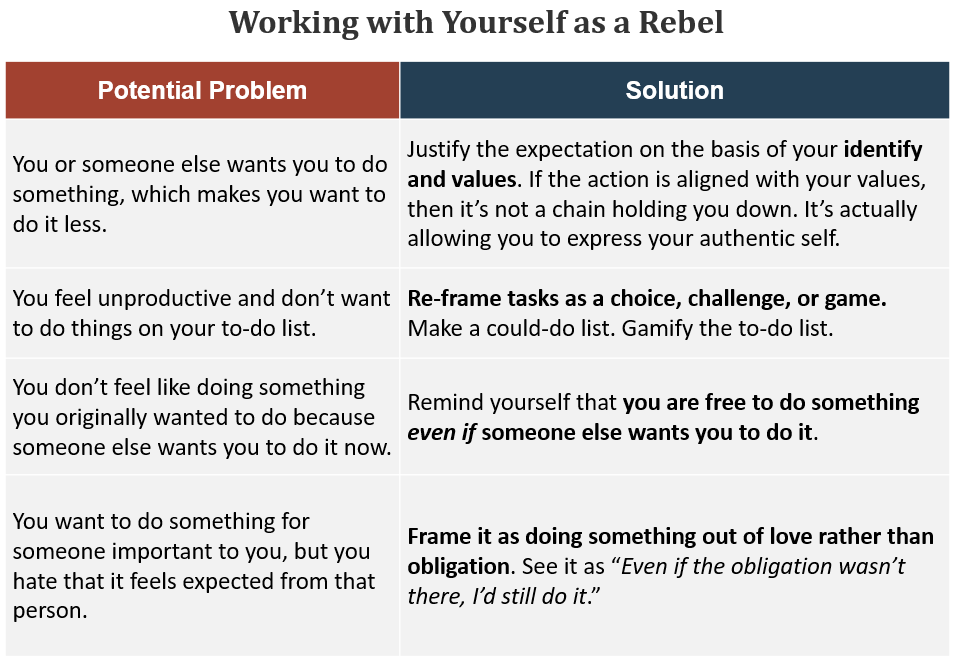
Working with a Rebel
The other tendencies tend to lack understanding for Rebels, making everyone’s lives harder in the relationship. When communicating with rebels, we should use this sequence: Information-Consequence-Choice. (By the way, the Information-Consequence-Choice sequence works with all tendencies. It’s just particularly important for Rebels).
The book gives an example of what a school counselor might say to a Rebel student who doesn’t want to do her volunteer hours:
“To graduate high school, students must complete 100 volunteer hours. Students who start earlier as a freshman of sophomore have more choices about projects and when to do it. The longer students wait, the less choices they have. I know seniors who lost their spring break because they had to spend that time doing their service hours. My door is open whenever you’d like to talk about choosing a service project.”
After giving the Information-Consequence-Choice message, don’t monitor or nag them. They do best without supervision.
If a Rebel refuses to do something, don’t save them from the consequences. They need to experience the painful consequences for themselves to learn the importance of something.
Another way to motivate a Rebel is to challenge their identity. For example, instead of asking them to stop being late, say “Why do you keep being late? That’s just so inconsiderate!” If the Rebel doesn’t want to be seen as inconsiderate by you, he/she will likely be on time in the future.
A third way to motivate a Rebel is to challenge their ability. For example, you can say, “Well, it’s hard for many people to stay fit and healthy these days, so I’m not surprised you’re struggling too.” A statement like that may light a fire within a Rebel to prove themselves capable of overcoming that challenge.

How I’ve Applied the Four Tendencies to My Life
I know the tendencies of everyone that’s important to me or that I have to interact with on a regular basis. This allows me to predict their behavior in terms of responding to their inner and outer expectations.
If I don’t know someone’s tendency and I want to, I just ask them two questions.
First, “If you had a new year’s resolution to exercise more, how would you do it?” Upholders will just go do it. Obligers will probably doubt themselves or say they’ll look for a buddy. Questioners will probably talk about being efficient with their time and effort. Rebels will probably dislike the idea of forcing themselves to go to the gym.
Second, “If you had a friend who wanted to exercise more and has asked you to go to the gym together, what would you think?” Upholders will probably go if they have time (inner first, then outer). Obligers will probably go unless they really don’t want to. Questioners will focus rationalizing why they should go. Rebels will dislike the idea of having to make and stick to a plan.
FAQs
1. Is there a best tendency? Isn’t Upholder the best?
No. Each tendency has their own strengths and weaknesses. The happiest, wealthiest, and most productive people are those who built a life that leverages their strengths and figured out how to work around their weaknesses.
2. Can I change my tendency?
No. Besides, why would you even want to? No tendency is better than another.
3. Can I be multiple tendencies at one?
No. People fit squarely into one of the four tendencies. If you want to get into more detail, then technically, people fit into one of 8 primary-secondary combinations:
- Upholder-Questioner
- Upholder-Obliger
- Obliger-Upholder
- Obliger-Rebel
- Questioner-Upholder
- Questioner-Rebel
- Rebel-Obliger
- Rebel-Questioner
For example, a Questioner-Upholder is more likely to meet outer expectations than a Questioner-Rebel.
4. Doesn’t everyone fit into every tendency?
Everyone responds to logic (not just Questioners). Everyone meets expectations if it’s important to someone we care about (not just Obligers and Upholders). Everyone desires freedom of choice (not just Rebels). But your tendency tells you your primary response driver to the question, “How do you respond to inner and outer expectations?”
5. Is my tendency similar to my personality?
No. Your tendency simply answers the question, “How do you respond to inner and outer expectations?” Your tendency interacts with your personality. For example, a Rebel who is very conscientious and ambitious would behave very differently from a Rebel is laid-back and carefree.


















0 Comments: